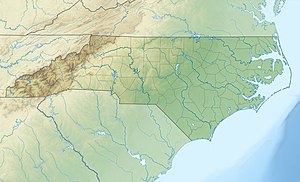Beaverdam Creek is a 1.04 mi (1.67 km) long tributary to Crabtree Creek in Wake County, North Carolina and is classed as a 2nd order stream on the EPA waters geoviewer site.[3]
| Beaverdam Creek Tributary to Crabtree Creek | |
|---|---|
| Location | |
| Country | United States |
| State | North Carolina |
| County | Wake |
| City | Raleigh |
| Physical characteristics | |
| Source | confluence of Southwest Prong and Southeast Prong of Beaverdam Creek |
| • location | Raleigh, North Carolina |
| • coordinates | 35°48′58″N 078°39′41″W / 35.81611°N 78.66139°W[1] |
| • elevation | 252 ft (77 m) |
| Mouth | Crabtree Creek |
• location | Raleigh, North Carolina |
• coordinates | 35°49′28″N 078°38′52″W / 35.82444°N 78.64778°W[1] |
• elevation | 200 ft (61 m)[1] |
| Length | 1.04 mi (1.67 km)[2] |
| Basin size | 3.66 square miles (9.5 km2)[3] |
| Discharge | |
| • location | Crabtree Creek |
| • average | 4.36 cu ft/s (0.123 m3/s) at mouth with Crabtree Creek[3] |
| Basin features | |
| Progression | Crabtree Creek → Neuse River → Pamlico Sound → Atlantic Ocean |
| River system | Neuse River |
| Tributaries | |
| • left | Southwest Prong |
| • right | Southeast Prong |
| Bridges | Glenwood Avenue (US 70), Scotland Street |
Course
editBeaverdam Creek is formed at the confluence of the Southeast and Southwest Prongs in northwestern Raleigh, North Carolina. It then flows northeast through the Carolina Country Club to meet Crabtree Creek. About 5% of the watershed is considered to be forested.
Watershed
editBeaverdam Creek drains 3.66 square miles (9.5 km2) of area. The confluence is at the border of felsic gneiss, but the stream then flows over Falls Leucogneiss.[4] The watershed receives an average of 46.6 in/year of precipitation and has a wetness index of 390.31.[3]
See also
editExternal links
editReferences
edit- ^ a b c "GNIS Detail – Beaverdam Creek". geonames.usgs.gov. US Geological Survey. Retrieved 14 September 2019.
- ^ "ArcGIS Web Application". epa.maps.arcgis.com. US EPA. Retrieved 14 September 2019.
- ^ a b c d "Beaverdam Creek Watershed Report". Waters Geoviewer. US EPA. Retrieved 14 September 2019.
- ^ "Wake County Geologic Map". www.arcgis.com. North Carolina Geological Survey. Retrieved 18 September 2019.

